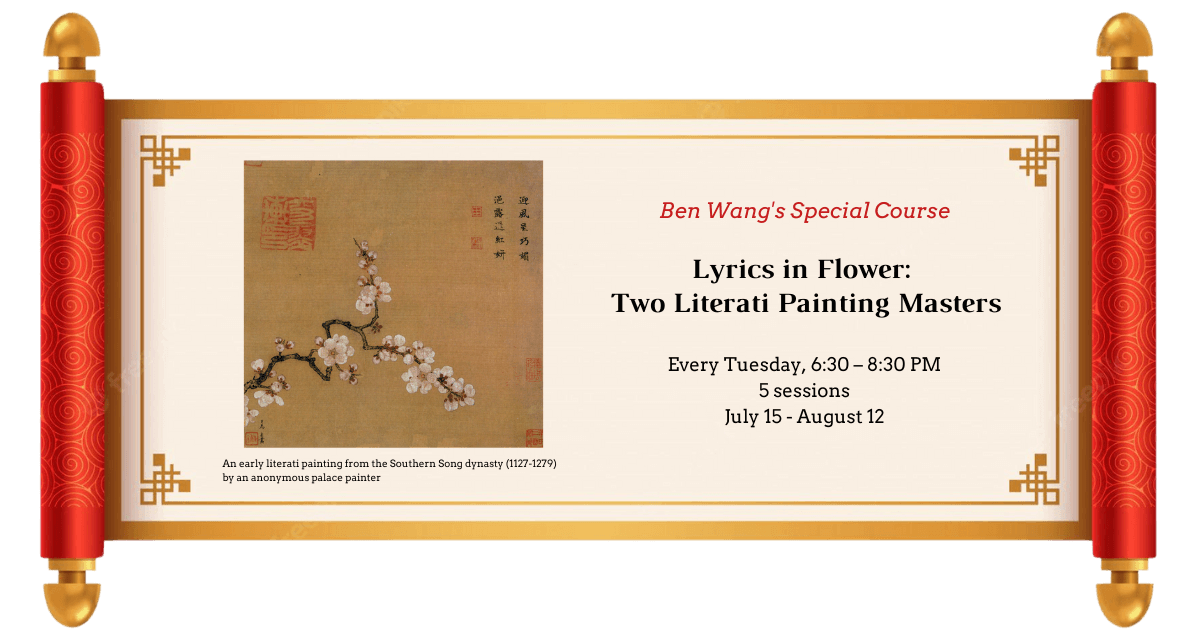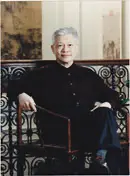
A Special Course by Ben Wang:
Lyrics in Flower: Two Literati Painting Masters
Summer 2025 Registration is Now Open!
Register by June 15 to receive $30 off tuition!
The vibrant blossoms of flowers have long provided artists in the West with inspiration, with many dedicating their careers to produce pictures of botanical beauties. From 17th-century Dutch still-life to modern day paintings, flower art has a long and storied history.
Artists of fine art in China started to paint flowers during the Han dynasty (202 BC-25 AD), when it became a popular hobby for many anonymous palace ladies, the imperial consorts, of all ranks, as both an expression of their fondness of Nature, and to court the favor of the emperors, most of whom aficionados of art and beauty.
Towards the end of Northern Song dynasty (960-1127), as Poetry and Calligraphy had reached their height of glory, China saw the emergence of a literary and artistic genre named Literati Painting. It exemplifies as a genre uniquely blending Poetry, Music, Calligraphy and Painting, As an ancient Greek poet claimed, “Painting is silent poetry; and poetry, painting that sings,” This statement is fully manifested in Literati Painting, for the visceral written Chinese language is comprised of meaning, picture and music! The new genre had its golden, halcyon days from the 10th century through the dawning years of the Manchu dynasty in the 17th century and lasted well until Mid-20th century.
One of the favorite subjects, blossoms in the painting are joined by evocative and exquisite lyrics in the finest calligraphic art to give viewers a rounded joy of appreciation for literature, linear beauty, tonal perfection, and the beloved flowers themselves. In no other works of prominent artists is it more evidenced that the blossoms and their literary and artistic companions are more memorable than in those by Yun Shou-ping 惲壽平 (1633-1690) and Wang Shi-shen 汪士慎 (1686-1759), the two inimitable masters of the late Ming and the following Manchu dynasties.
This summer course marks the very first time the two artists and their extraordinary works redolent of fine art, poetry and calligraphy — the 3 most treasured jewels held in the highest esteem by all art lovers — are introduced by the lecturer, Ben Wang of China Institute.
Fees
5 sessions (10 hours)
$280 member / $320 non-member
(plus a $30 non-refundable registration fee)
This class will be taught in English.
Instructor

Ben Wang
Ben Wang: Senior Lecturer in Language and Humanities at China Institute, Co-Chair of Renwen Society of China Institute, retired Instructor of Chinese at the United Nations Language Program. A published writer on classical Chinese poetry and others, Ben Wang is an award winning translator both from Chinese into English and vice versa; He taught Chinese and translation at Columbia University, New York University, Pace University and City University of New York between 1969 and 1991.
Ben Wang teaches and lectures on the Chinese language, calligraphy, and classical Chinese literature, including the Book of Songs, the Songs of the South; Han, Tang and Song poetry; Yuan and Ming poetic dramas; Story of the Stone of the Qing; classical Kunqu Drama and Beijing Opera; Literati Painting. Ben Wang’s lectures on and translations of Kunqu dramas have been reviewed and acclaimed three times in the New York Times by the Times’ music and drama critic James Oestreich as “magnificent,” “captivating,” and “colorful.”
Since 1989, Ben Wang has lectured (extensively on the above-mentioned subjects)at Yale, Princeton, Columbia, Barnard, Williams, U.C. Berkeley, New York University, Bates, Colby, Hamilton, Middlebury, Rutgers, Seton Hall, St. Mary’s College in California, the Smithsonian, the National Gallery of Art, United Nations, Lincoln Center, the Metropolitan Museum of Art, Seattle Art Museum, Museum of Fine Arts of Boston, ABC Nightline, the BBC, among other academic and cultural institutions.
Latest publications in English:
- Forlorn in the Rain: Translation and Annotation of Selected Classical Chinese Poetry and Others; Published by Foreign Languages Publishing Bureau, Beijing, China: Oct. 2018
- A series of 4 books on the Forbidden City in Beijing, China:
- We All Live in the Forbidden City
- This Is the Greatest Place!
- Bowls of Happiness
- What Was It Like, Mr. Emperor?
(Published by China Institute and Released by Tuttle Publishing; 2014, 2015, the series has garnered 9 US book awards, as of September 2016.)
- Laughter and Tears: Libretti from Highlight Scenes of 26 Classical Poetic Kunqu Dramas; Published by Foreign Languages Publishing Bureau, Beijing, China: 2009.
(January 2019)